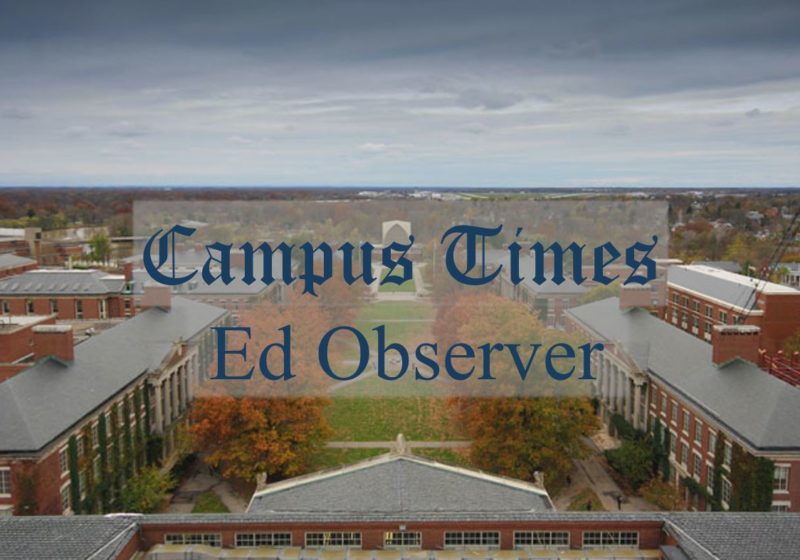Over winter break, I traveled to Israel with a group of 40 other college students, who mostly hailed from UR or University of Michigan. Birthright Israel, the group that organizes these trips, provides a free 10-day trip to Israel to pretty much any Jew between the ages of 18 and 30.
Many go on this trip with little knowledge of the country. But as the child of two rabbis who sent me to Israel for about two months in high school, I happen to know a lot about it.
I wasn’t surprised by much of what we did on the trip — I’d already seen the ancient religious sites of Jerusalem, the northern mountains dotted by streams, the beautiful rocky desert nights, the way metropolitan Tel Aviv abruptly ends, replaced by a picturesque Mediterranean beach. I’d also seen explosions on the other side of the Syrian border, bullet holes in the wall separating the West Bank from Israel, and I’d seen tear gas and smoke rise up past the Dome of the Rock. It’s impossible to please everyone — or anyone — when talking about this region, and defining how many states should and do exist there. But I was struck by a few thoughts that stuck with me as I went back across the world to UR.
The first came during a discussion about public discourse on our college campuses about Israel. There is a line between reasonable and antisemetic criticism of Israel, and at Michigan, protests occur on both sides of that aisle.
My new friends from Michigan talked of how a small crowd accused them of murder every time they walked out of Friday services.
How their events, meant to celebrate something that was important to them, drew protestors, claiming the events upheld a murderous regime.
How they felt that any discussion on the issue was futile, always devolving into mudslinging and name-calling.
While sympathetic, I felt relieved that this hasn’t been my experience at UR. And then I felt ashamed.
I was ashamed because I saw that what was making Jews at Michigan feel threatened was mirrored by the tunnel controversy that made Tibetan and Hong Kong UR students feel threatened, and I hadn’t done much to help them. Jewish tradition dictates an obligation to help the oppressed, because our people have been oppressed in the past.
I see the same pain of my Jewish peers at Michigan in my Tibetan and Hong Kong peers at UR.
They have the same constant protests. The same valid criticisms used to justify the prejudiced extremes. The same use of University systems to suppress support for the threatened. The same forgotten truth that moderates are not responsible for their extreme peers.
I was ashamed also because I saw reflections of a more dramatic pain afflicted upon my people. On my trip we visited Israel’s national Holocaust museum. We were told how, for various reasons, the countries of the world stood by as six million of my people, and five million other people were killed in Europe. Some hated Jews, others felt it wasn’t their place to weigh in on what was seen as a problem for eastern and central Europe, still more weren’t sure what was really happening, either due to inconsistent reports at the time, or because they were actively deceived by their government trying to hide a genocide.
One of the major talking points surrounding the Holocaust seems to be shock at the ignorance and compliance of the rest of the world. How could the whole world not know? And if they did, how could they let such atrocities happen?
I look at the reports coming out of Xinjiang and wonder what is really happening there. Individual narratives of escapees get buried deep in newspapers, and the official word of the Chinese government is denial. I wonder if some future Uighur person will learn about their people’s history, and the world’s apathy, and ask the same questions I did about the Holocaust.
I need to do more. We all do. Martin Luther King wrote from his Birmingham jail cell that, “injustice anywhere is a threat to justice everywhere.” From our vantage point up in the ivory tower of this elite east-coast institution, we have an even greater obligation to prevent oppression and hatred because of tools our privilege provides us.
We attend a university with a diverse population of Chinese students, and students from groups that feel marginalized in China. We also have students who feel many different ways about Israel. We need to have open, honest discussions about what the facts are, and what we believe, without the scare tactics, mudslinging, close-mindedness, and prejudice that tend to go hand-in-hand with these discussions.
When people are oppressed around the world, we need to pressure our governmental representatives, our University administrators, our peers, and ourselves to do something, anything, to help. It isn’t enough to educate ourselves in lofty academic pursuits, earn a degree, and make some friends. We also have to educate ourselves on the issues in the world that actually matter. We, if for no other reason than our privileged status as elite University students, should not be able to take it easy and avoid acting to help people worldwide.



